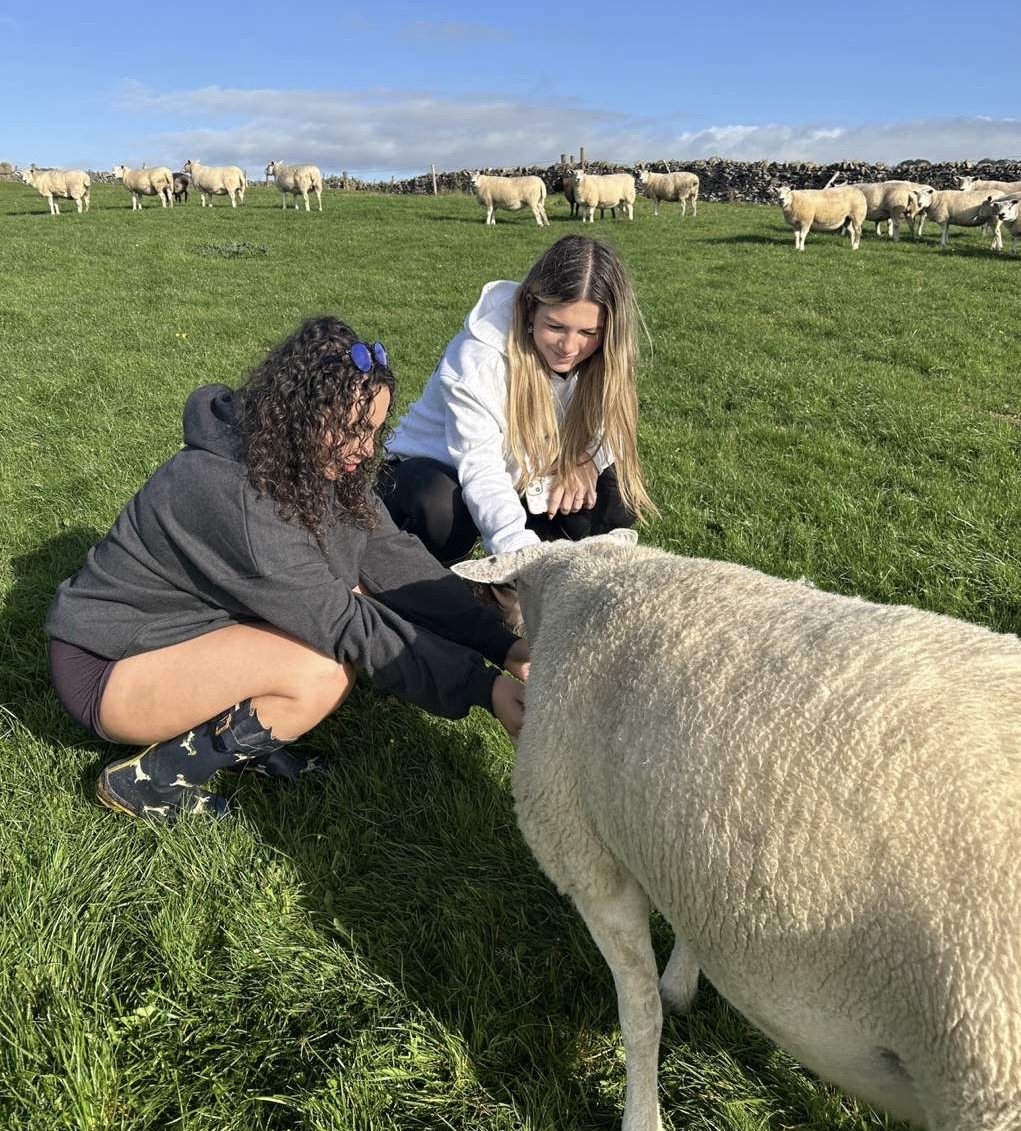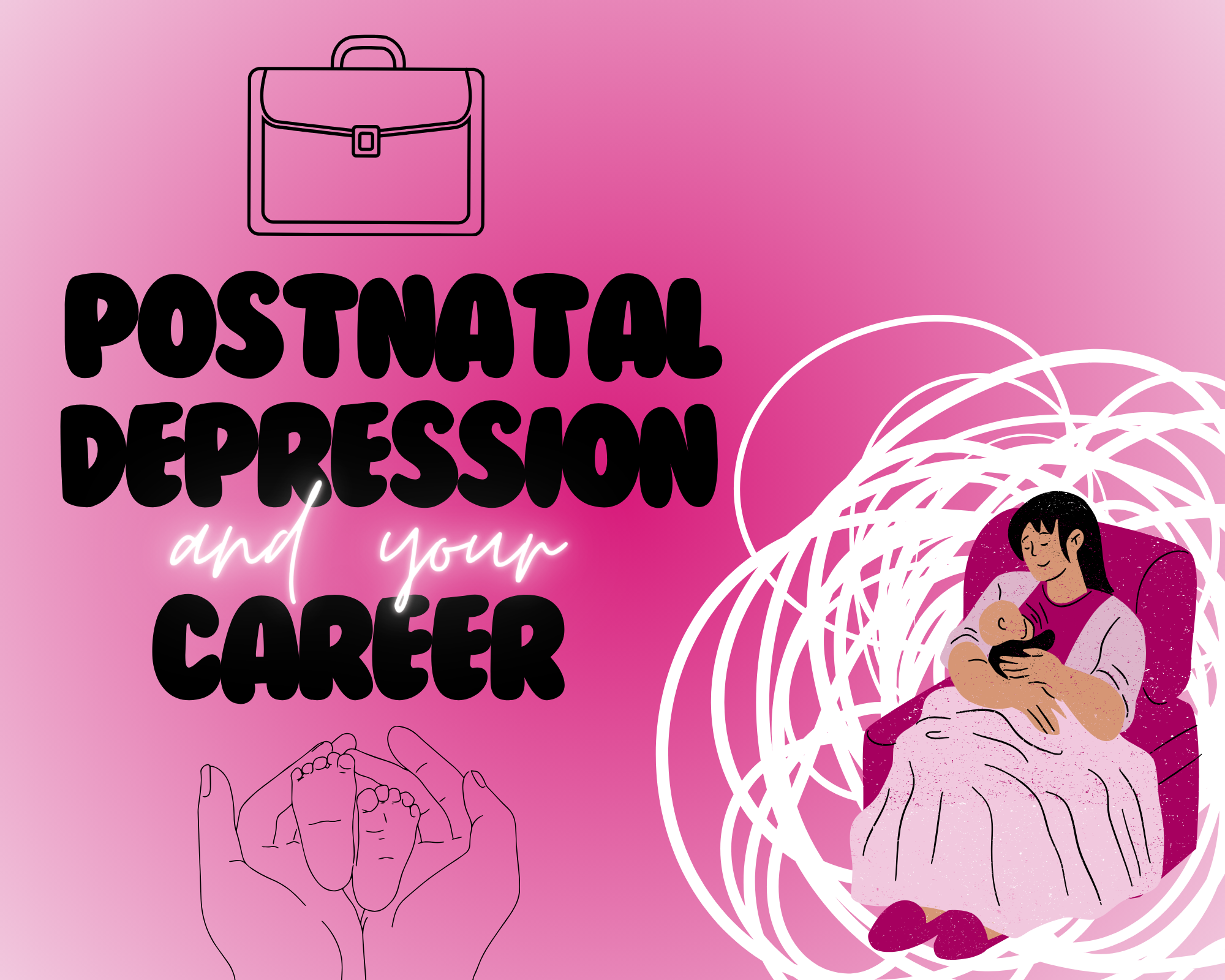For aspiring women in farming, the world of agricultural can feel dominated by masculinity, but it’s time to get the narrative moo-ving.
Women farmers across the country are the backbone to the industry, from animal husbandry to in-house support, and everything in between. However, recognition of their dedication, determination and strength has been largely pushed aside, until now.
Farming has often been pictured as a family-orientated, exclusive industry that is led by the ‘man of the house’. However, in reality, the industry has evolved into a world of careers for everyone, and you can get your own spot on the playing field.
Sophie Wilson, 28, an employee at a livestock feed company, has broken the mould from her non-farming family after attending Harper Adams University to study animal sciences. From lambing to milking cows at her friend’s farm, Miss Wilson fell in love with the industry and despite her lack of experience, pursued her dreams.
She said: “I’ve always enjoyed being in the countryside and being outside but it was going to Harper Adams and then doing a placement year that’s got me into the industry.
“None of my family are in farming at all and in secondary school I had no real interactions with farming, but it’s actually more common in the feed industry for women, and men, to come from non-farming backgrounds nowadays.”
Universities and colleges have become gateways for women to get into the industry, regardless of their background, with Higher Education enrolment figures showing that 25% more women than men are enrolling into agricultural-related courses.
These courses have marked a pivotal turning point for women to begin their agricultural careers, with ‘farmerettes’ historically being limited to farmers’ daughters and wives. However, with new opportunities on the rise for non-farmers, the horizons are looking brighter for all.
Sophie spoke about the importance of agricultural courses for her journey: “I think there is much more help about where you can go nowadays and having universities and colleges specialising in agriculture are gateways you can use to start your career.
“There are so many jobs that can suit loads of women. It’s probably important to have some sort of practical background or knowledge within it so you’re not afraid to go to the farms and be around the animals. But other than that you can learn most of what you need to.”
With institutions allowing young aspiring farmers to showcase their talents and dedication, getting involved has never been easier. Although there is still a long way to go, as government statistics show that despite only 25% of workers being women, in reality, 55% of workers are women when including unpaid wives and daughters on the farm.
In an attempt to bridge the gap, many organisations are fighting for the recognition of women’s work, such as Farmer’s weekly’s campaign: Level The Field. The campaign has been supported by NFU, the CLA and business Frontier Agriculture in aiming to make the industry “more equitable and more inviting for women”.
With campaigns fighting for equality, representations of women farmers across the UK have risen, and made for a more inclusive environment for all. Groups such as ‘Ladies in Beef’ have formed to promote their place in the British beef industry. The organisation is made up of lady British beef farmers who drive awareness of the quality and versatility of British beef.
Co-founder of the group, Jilly Greed, 67, speaks on her experience as a woman farmer: “I think for a long time in traditional farms women were not given the opportunity to take over the reins of the family business and that was certainly the case for me. A lot of it was about physicality, and I wasn’t considered physically brawny enough to actually be doing a farm job.
“That isn’t the case now, I think it is much more about ability, your practical and also educational skills – so it’s very exciting times I think for women. Women in families that farm have been doing lots of the support stuff since forever, but now there’s much more recognition and an open armed welcome for women.
“Women bring a diverse range of skills and ability to farming, and have done in the past, but now it’s open and out there, there’s much more career opportunities and it’s only going to increase from here which I think is great. There are also more opportunities for women from non-farming backgrounds such as young farmers clubs, work experience opportunities and education.”
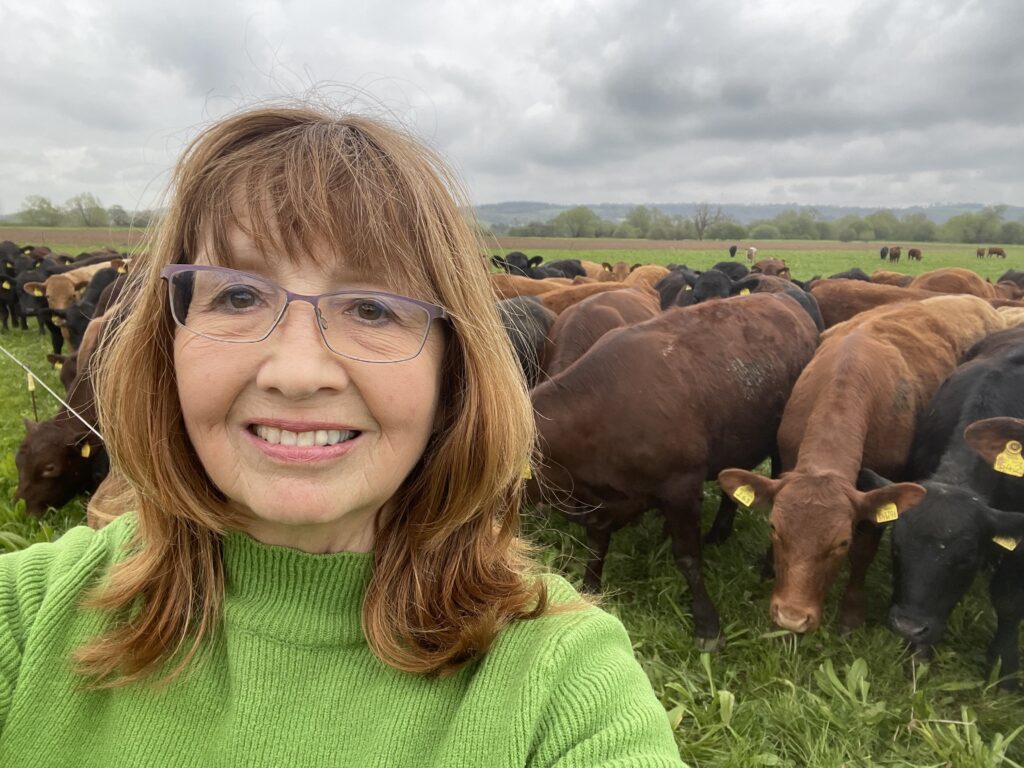
Image: Jilly Greed on her farm
Jilly is also the trustee director of ‘The institute of agriculture and horticulture’ (TIAH) which offers online training courses for careers in agriculture. With women farmers advocating for spaces in the industry, barriers have been raised and aspiring women farmers have never been more supported.
She added: “Sometimes I forget how much harder it was when I started, women had this burning rage inside us and I don’t have that anymore because I think the industry has come such a long way, and I think this recognition is fantastic.”
Young farmer, Bella Fargeot-Deadman, 17, is a woman who has been inspired by campaigns and online sites, after not finding many women farmers on her family beef farm in Hampshire.
She said: “I follow the National Farming Union (NFU) on Instagram and it’s nice to see women are quite well-represented on there. I don’t really have any friends my age interested in farming, so it’s nice to join groups like young farmers to find people with common interest.
“If a woman wants to get into farming, they absolutely can, and I would suggest trying to find some experience with a farmer and get opportunities from there. Farmers are always looking for help, there’s a massive labour shortage, so I think a lot would consider taking you on as work experience. You’ve got to probably be determined, but it’s very possible.”
With opportunities for young women increasing by the day, farming could be the career choice for you to break these barriers and unite with like-minded women. It’s time for you to grab life by the horns and get started with pursuing your dream.
The History of a Farmerette
Pamela Lawton, 82, has been in the farming industry her whole life, and was one of few women paid for her work on her father’s farm from being a young girl. She recalls her time at the sheep auctions, driving the horse and cart and helping on the dairy farm. She believes the history of farming for women is how things have changed so much for our modern day society.
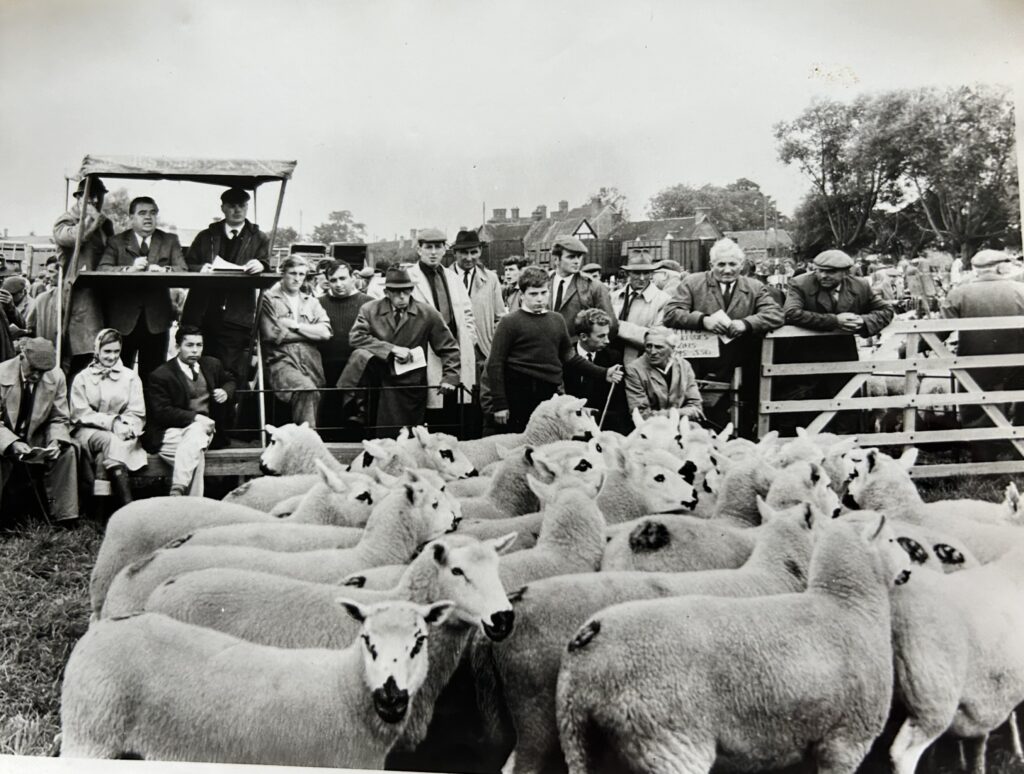
Image: Mrs Lawton at a sheep auction with her father
“I worked for my father, and I knew quite a few girls that worked for their fathers, and we were always respected when we were out and about. I was paid every month out my father’s bank for the work I had done. I was quite lucky really.
“But, it was unheard of for women to own a farm in those days, or even rent. It was only if women were in partnership with their husband on paper. I think because housework was different in those days, everything had to be done by hand, and there would have been no time for the women to properly work on a farm, never mind run it. My mother used to cook meals for all the farm men and had no time for anything else!
“The reality is loads of women own their own farm now, and they’re very successful at it and I think it’s brilliant really. If you want to do farming, people from non-farming backgrounds can go to all sorts of colleges now. I think you’ve got to be very determined and tough, but it’s very possible to do so.
“I went to an agricultural college to do dairy, poultry and catering. They took 10 girls a year, but there was no one there without farming connections. It wasn’t like how it is now. Farming has changed a lot, it is all by computer and technology. You can get tractors that go where you tell it to now, which is probably why it’s opened more spaces for not just women, but everyone, as there is more farming jobs that need different skills and the places you can go to apply them.”
Mrs Lawton’s re-collection of her childhood shows the steps the agricultural industry has made to include and celebrate women’s place in this sphere. The ‘farmerette’ stereotype, coined from 1901, comes from the history of wives and daughters holding the backbones of the farm, yet rarely getting a seat at the table themselves. But, it’s time to change the narrative, as women from non-farming backgrounds, and daughters and wives, are now crucial to lead roles in the agricultural world.
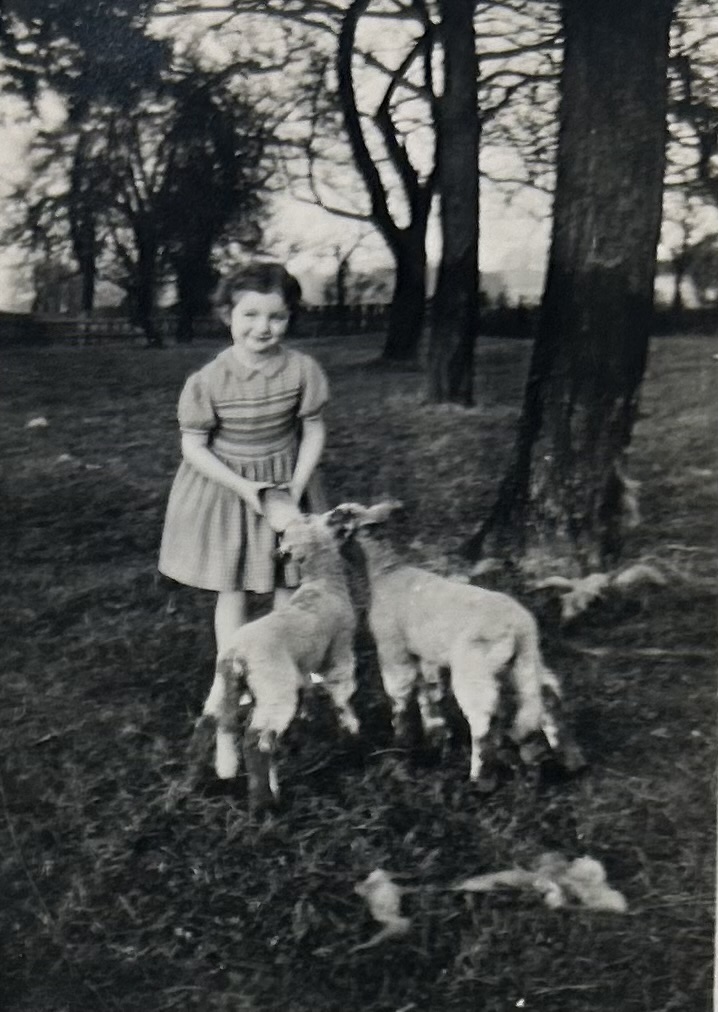
Image: Mrs Lawton as a child on her family sheep farm

